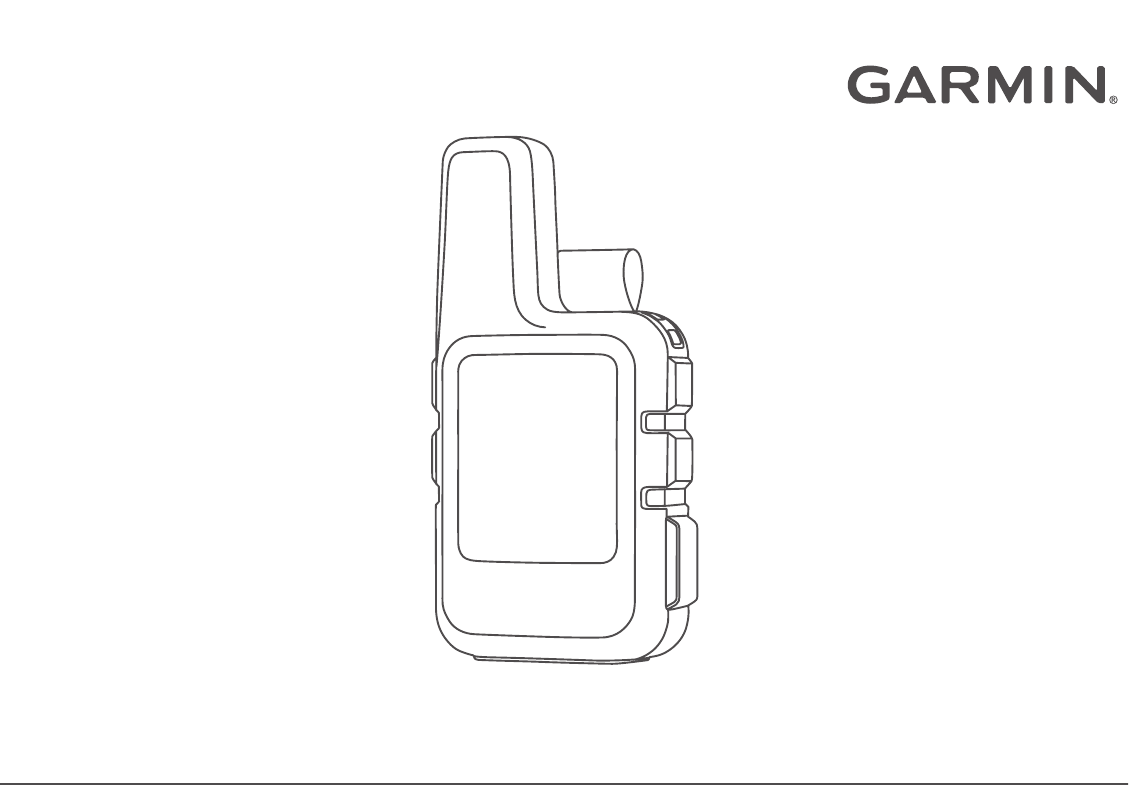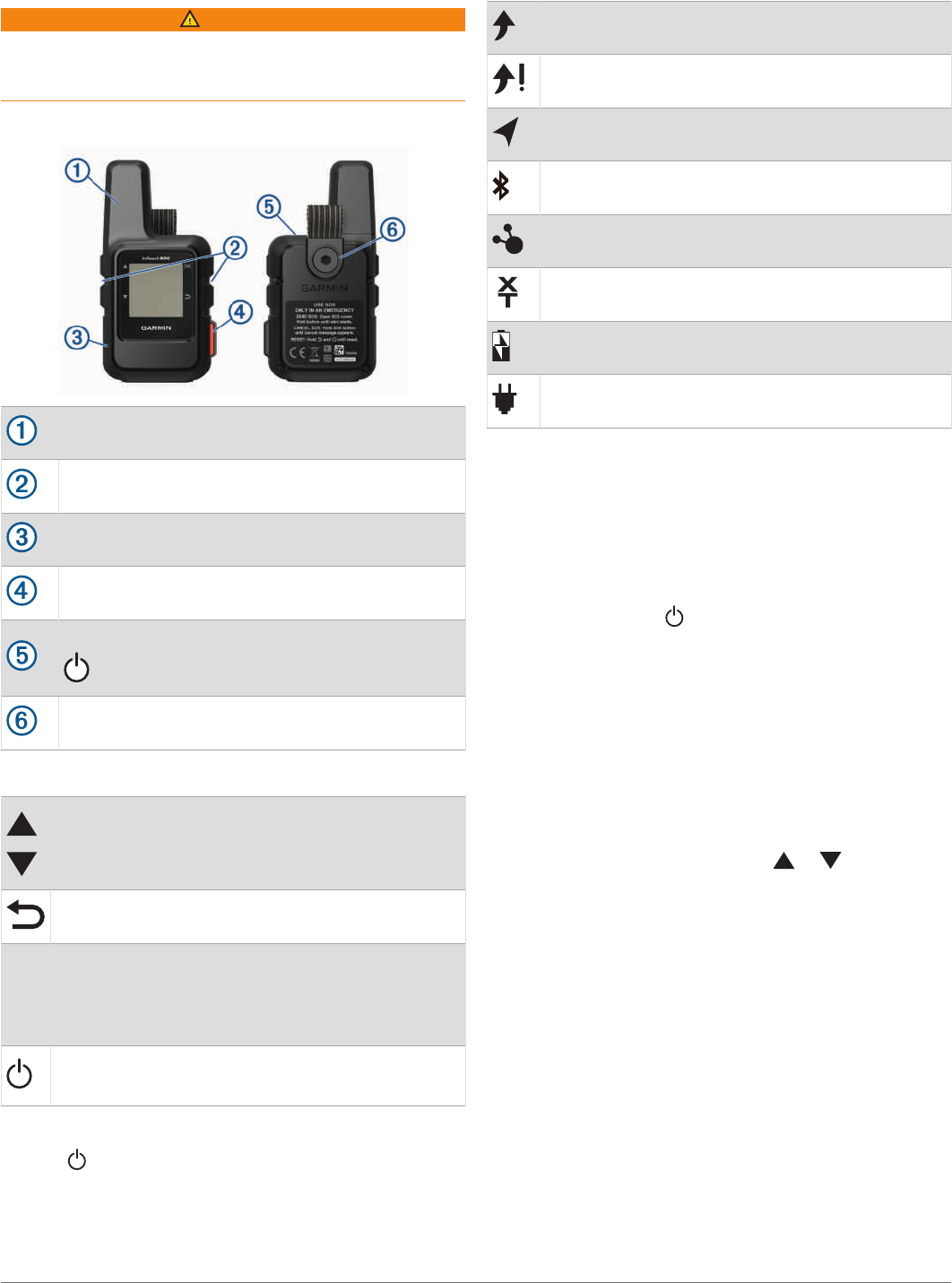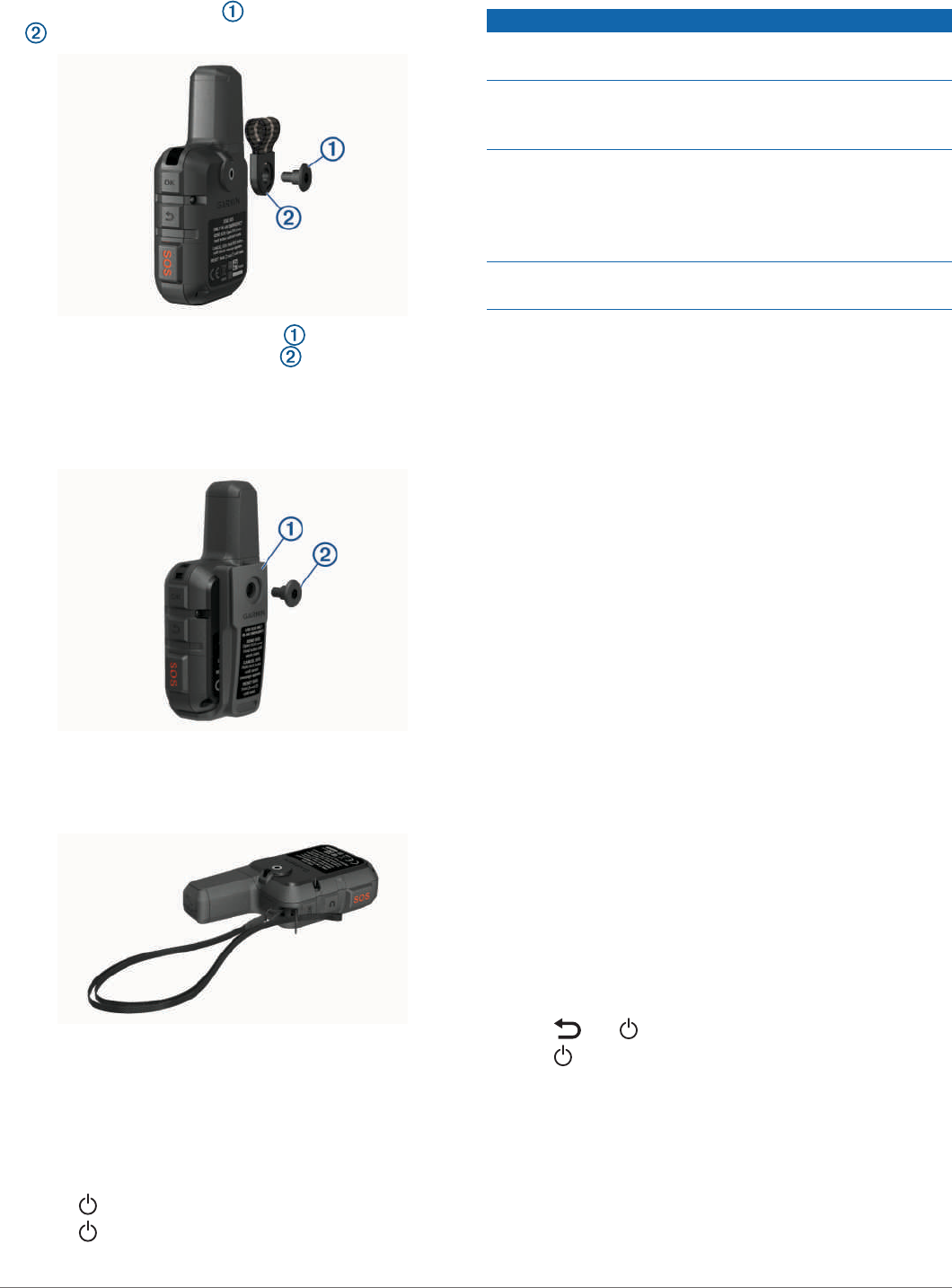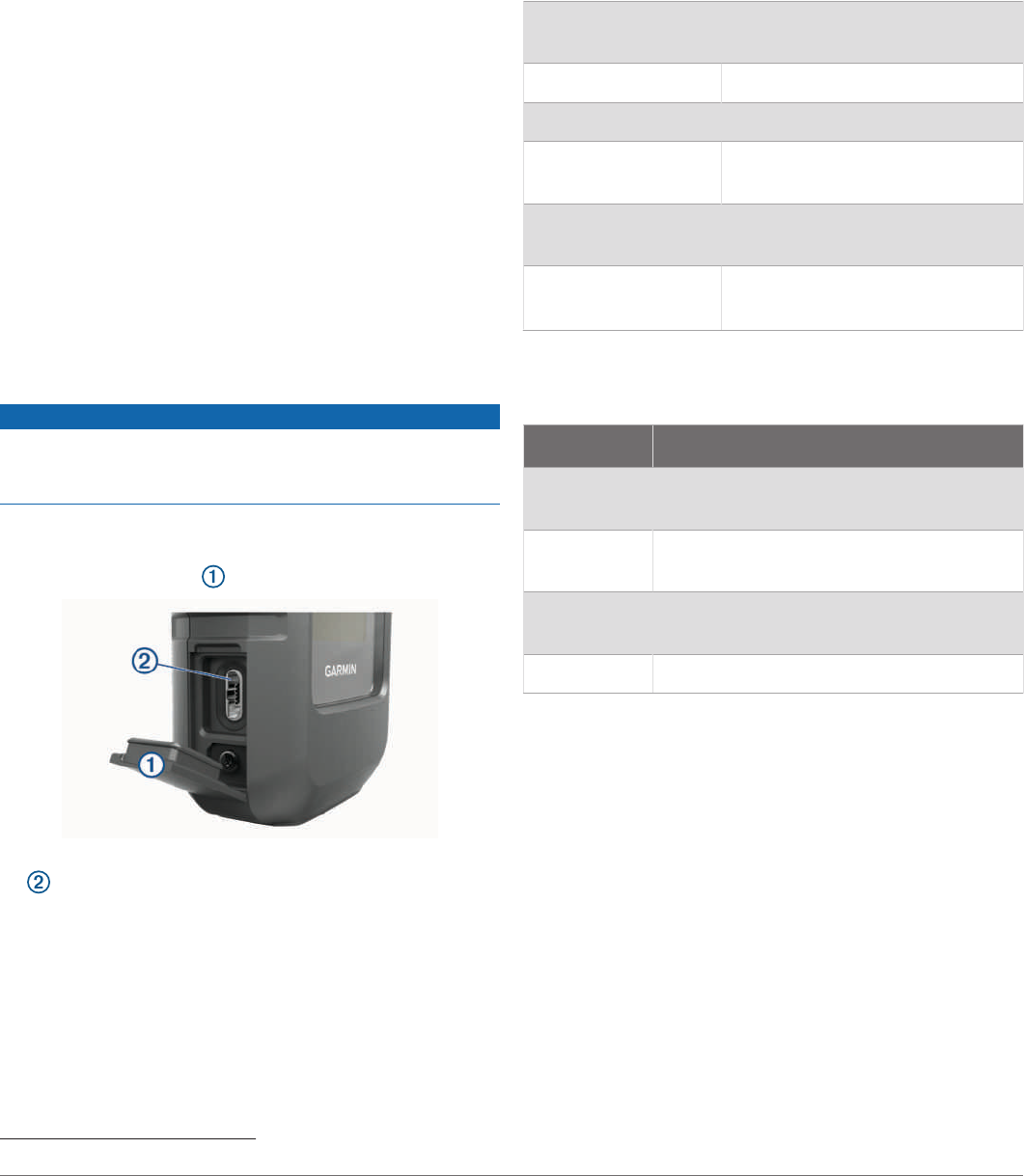
INREACH
®
MINI
Owner’s Manual
© 2018 Garmin Ltd. or its subsidiaries
All rights reserved. Under the copyright laws, this manual may not be copied, in whole or in part, without the written consent of Garmin. Garmin reserves the right to change or improve its products
and to make changes in the content of this manual without obligation to notify any person or organization of such changes or improvements. Go to www.garmin.com for current updates and
supplemental information concerning the use of this product.
Garmin
®
, the Garmin logo, ANT+
®
, Earthmate
®
, fēnix
®
, inReach
®
, and TracBack
®
are trademarks of Garmin Ltd. or its subsidiaries, registered in the USA and other countries. Garmin Explore
™
,
Garmin Response
SM
, and MapShare
™
are trademarks of Garmin Ltd. or its subsidiaries. These trademarks may not be used without the express permission of Garmin.
The BLUETOOTH
®
word mark and logos are owned by the Bluetooth SIG, Inc. and any use of such marks by Garmin is under license. Facebook
™
and the Facebook logo are trademarks of
Facebook and its affiliate companies. Iridium
®
is a registered trademark of Iridium Satellite LLC. TWITTER
™
and the Twitter logo are trademarks of Twitter, Inc. or its affiliates. Other trademarks
and trade names are those of their respective owners.

Table of Contents
Getting Started..................................... 1
Device Overview............................................1
Keys............................................................... 1
Turning On the Device.................................. 1
Status Icons.................................................. 1
Viewing the Main Menu................................ 1
Power Menu.................................................. 1
Main Pages................................................... 1
Bluetooth Connected Features.............. 2
Pairing Your Mobile Device.......................... 2
Activating the Device............................ 2
Iridium Satellite Network...................... 2
Testing the Device................................ 2
Syncing inReach Data........................... 2
Messages............................................. 2
Sending a Preset Message.......................... 2
Sending a Text Message.............................. 2
Replying to a Message................................. 3
Posting to Social Media............................... 3
Checking for Messages............................... 3
Viewing Message Details............................. 3
Navigating to a Message Location..............3
Deleting Messages....................................... 3
Contacts............................................... 3
Viewing a Contact.........................................3
Deleting a Contact........................................ 3
SOS...................................................... 3
Initiating an SOS Rescue.............................. 4
Sending a Custom SOS Message................ 4
Canceling an SOS Request...........................4
Tracking............................................... 4
Clearing the Track Log................................. 4
Starting Tracking.......................................... 4
Stopping Tracking........................................ 4
Sharing Your MapShare Web Page............. 4
Navigation............................................ 4
Acquiring GPS Satellite Signals................... 4
Routes........................................................... 5
Navigating a Saved Route........................ 5
Reversing a Route..................................... 5
Viewing Route Details...............................5
Deleting a Route........................................ 5
Waypoints..................................................... 5
Creating a Waypoint................................. 5
Navigating to a Waypoint......................... 5
Editing a Waypoint.................................... 5
Deleting a Waypoint.................................. 5
Navigating Using TracBack®.......................5
Stopping Navigation..................................... 5
Location........................................................ 5
Viewing and Sharing Your Current
Location..................................................... 5
Compass....................................................... 5
Weather................................................ 5
Adding a Weather Location..........................6
Setting the Weather Location...................... 6
Requesting a Weather Forecast.................. 6
Deleting a Weather Location........................6
Remote Control.................................... 6
Data Use and History............................ 6
Viewing Data Use..........................................6
Resetting the Data Use Counter...............6
Customizing the Device........................ 6
Display Settings............................................ 6
Tracking Settings.......................................... 6
Bluetooth Settings........................................ 6
ANT+ Settings............................................... 7
Messages Settings....................................... 7
Sounds Settings............................................7
Time Settings................................................ 7
Units Settings................................................ 7
Automatically Turning Off the Device......... 7
Changing the Device Language................... 7
Adding Owner Information........................... 7
Device Information............................... 7
Support and Updates....................................7
Attaching the Spine Mount Adapter............ 8
Attaching a Lanyard..................................... 8
Locking and Unlocking the Keys..................8
Device Care................................................... 8
Cleaning the Device.................................. 8
Table of Contents i

Getting More Information.............................8
Troubleshooting........................................... 8
Maximizing Battery Life............................ 8
Resetting the Device................................. 8
Restoring All Default Settings.................. 8
Viewing Device Information..................... 9
My device is in the wrong language........ 9
Charging the Device..................................... 9
Saving Energy While Charging the
Device........................................................ 9
Specifications............................................... 9
Battery Information................................... 9
ii Table of Contents

Getting Started
WARNING
See the Important Safety and Product Information guide in
the product box for product warnings and other important
information.
Device Overview
Internal Iridium
®
antenna
Keys
Micro-USB port (under weather cap)
SOS button (under protective cap)
Power key
Mounting screw
Keys
Select to scroll through menus, pages, and
settings.
Select to cancel or return to the previous page.
OK
Select to choose an option or to acknowledge a
message.
From the home page, select to open the main
menu.
Select to turn the device on.
Select to open the Power menu.
Turning On the Device
Hold .
Status Icons
Sending and receiving data
Unable to send and receive data
Tracking enabled
Bluetooth
®
technology connection status
ANT+
®
technology enabled
Extended tracking mode enabled
Charging battery
Charging complete
Viewing the Main Menu
From the home page, select OK to open the main
menu.
Power Menu
The Power menu displays the device battery life. It also
allows you to adjust settings and turn off the device.
From any page, select .
Battery: Displays the current battery level.
Lock Screen: Locks the touchscreen to prevent
inadvertent key presses.
Turn Off: Turns off the device.
Brightness: Adjusts the brightness of the screen.
Mute Sounds: Mutes all device tones.
Main Pages
The main pages contain all the information you need to
operate your device. You can select or to scroll
through the pages.
Home page: Displays the date, time, and status icons
(Status Icons, page1). It also displays tracking and
weather information when those features are in use.
You can select OK to open the main menu.
Messages page: Enables you to send and receive text
messages (Messages, page2).
Mail Check page: Enables you to check for new messages
(Checking for Messages, page3).
Tracking page: Allows you to start and stop tracking.
While tracking, this page shows your distance traveled
and average speed (Tracking, page4).
Location page: Displays your current GPS location and
elevation (Location, page5).
Compass page: Displays your heading and speed when
you are moving (Compass, page5).
Getting Started 1

Bluetooth page: Enables you to pair the inReach device
with a compatible mobile device (Pairing Your Mobile
Device, page2).
Weather page: Enables you to request weather forecasts
(Weather, page5).
Bluetooth Connected Features
Your device has several Bluetooth connected features for
your compatible smartphone or mobile device using the
Earthmate
®
app. The Earthmate app allows you to use
inReach features such as maps, tracking, messaging, and
SOS on your mobile device.
Downloadable Features: View downloaded maps, aerial
imagery, USGS quadrangle maps, and NOAA nautical
charts on your mobile device. You should download
maps and charts before going on your trip.
Sync: Earthmate syncs your device with your explore
.garmin.com account, updating presets, waypoints, and
routes.
Messages: Allows you to read and write messages,
and access the contacts list on your mobile device.
Messages appear on both devices.
NOTE: You can have only one mobile device paired with
your inReach device at a time.
Pairing Your Mobile Device
You must pair your inReach device with your mobile
device to use Bluetooth features.
1 From the app store on your mobile device, install and
open the Earthmate app.
2 Place the inReach device and your mobile device within
3m (10ft.) of each other.
3 From the main menu, select Setup > Bluetooth > Pair
Device.
4 Follow the instructions in the Earthmate app to
complete the pairing and setup process.
After the devices are paired, they connect automatically
when they are turned on and within range.
Activating the Device
Before you can use your inReach Mini device, you must
activate it.
1 Create an account, and select a satellite subscription
at explore.garmin.com.
2 Turn on the device.
3 Follow the on-screen instructions.
4 When prompted, go outdoors to an open area with a
clear view of the sky.
5 Wait while the device communicates with the Iridium
satellite network.
NOTE: It may take up to 20 minutes to activate your
device. The device must send and receive several
messages, which takes longer than sending a single
message during regular use.
Iridium
Satellite Network
Your device requires a clear view of the sky to transmit
messages and track points over the Iridium satellite
network. Without a clear view of the sky, your device
attempts to send the information until it acquires satellite
signals.
TIP: For the best connection with satellites, attach the
device to a backpack or to your upper body.
Testing the Device
You should test the device outdoors before using it on a
trip to ensure your satellite subscription is active.
From the main menu, select Utilities > Test Service >
OK.
Wait while the device sends a test message. When you
receive a confirmation message, your device is ready
to use.
Syncing inReach Data
You can sync data from your explore.garmin.com
account. After you make edits to your data, such as
contacts, preset messages, or quick text messages, you
must sync them to your device from explore.garmin.com.
1 Go to explore.garmin.com.
2 Select Plans & Devices.
3 Next to your device, select Sync & Update.
4 Follow the on-screen instructions.
Messages
Your inReach Mini device sends and receives text
messages using the Iridium satellite network. You can
send messages to an SMS phone number, an email
address, or another device with inReach technology. Each
message you send includes your location details.
NOTE: A preset message includes predefined text with
predetermined recipients, and you must set it up on the
Garmin Explore
™
website.
Sending a Preset Message
Preset messages are messages that you created at
explore.garmin.com. Preset messages have predefined
text and recipients.
1 From the main menu, select Send Preset.
2 Choose a preset message, and select Send.
TIP: You can select View Details to view the content
and recipient of the preset message.
Sending a Text Message
1 From the Messages page, select OK.
2 Select New Message > Select Contacts.
3 Choose recipients from your contacts list, and select
Done.
2 Bluetooth Connected Features

4 Select an option:
• To start with a pre-written message, select Pick
Quick Text.
NOTE: You can add and edit quick text messages on
the Garmin Explore website.
• To write a custom message, select Write Message.
NOTE: To select from the autocomplete options,
begin typing a word, hold OK, and use and
to scroll through the options.
5 When you have finished your message, select >
Send.
Replying to a Message
1 From the Messages page, select OK.
2 Select a conversation, and select Reply.
3 Select an option:
• To start with a pre-written message, select Pick
Quick Text.
• To write a custom message, select Write Message.
4 When you have finished your message, select >
Send.
Posting to Social Media
1 From the Messages page, select OK.
2 Select New Message > Select Contacts.
3 Select one or more options:
• To post to your Facebook
™
account, select .
• To post to your Twitter
™
account, select .
• To post to your MapShare
™
web page, select .
4 Select Done.
5 Select an option:
• Select Write Message to create a new message.
• Select Pick Quick Text to select a quick text
message.
6 Select Send.
Checking for Messages
Your device listens for new messages at regular listen
intervals. Satellites announce recently sent messages,
and your device receives the message at the next listen
interval. The device will listen for 10 minutes after you
send a message, and then again every hour.
NOTE: Your device must be in view of a satellite at the
time of the listen to receive messages.
You can force a check for messages by manually
checking for messages, sending a message, or sending
a track point. During a check, your device connects to
satellites and receives messages waiting to be sent to
your device.
From the Mail Check page, select OK.
Viewing Message Details
1 From the Messages page, select OK.
2 Select a conversation.
3 Select a message, and select OK.
Navigating to a Message Location
When you receive a message from another device with
inReach technology, the message may include location
information. For these messages, you can navigate to the
location from which the message was sent.
1 From the Messages page, select OK.
2 Select a conversation with location information.
3 Select a message.
4 Select OK > Navigate.
Deleting Messages
1 From the Messages page, select OK.
2 Select a message.
3 Select Delete Thread.
Contacts
You can add contacts to the Garmin Explore website and
sync them to your device. Go to explore.garmin.com.
Viewing a Contact
1 From the main menu, select Utilities > Contacts.
2 Select a contact, and select View Details.
Deleting a Contact
1 From the main menu, select Utilities > Contacts.
2 Select a contact, and select Delete.
SOS
WARNING
Before you can use the SOS function, you must have
an active satellite subscription. Always test your device
before you use it outdoors.
Ensure you have a clear view of the sky when using
the SOS function, because this feature requires satellite
access to operate properly.
NOTICE
Some jurisdictions regulate or prohibit the use of satellite
communications devices. It is the responsibility of the
user to know and follow all applicable laws in the
jurisdictions where the device is intended to be used.
During an emergency, you can use your inReach Mini
device to contact the Garmin Response
SM
center to
request help. Pressing the SOS button sends a message
to the Garmin Response team, and they notify the
appropriate emergency responders of your situation. You
can communicate with the Garmin Response team during
your emergency while you wait for help to arrive. You
Contacts 3

should only use the SOS function in a real emergency
situation.
Initiating an SOS Rescue
You can initiate an SOS rescue with the device turned on
or off if the device has battery power.
1 Lift the protective cap from the SOS button .
2 Press and hold the SOS button.
3 Wait for the SOS countdown.
The device sends a default message to the emergency
response service with details about your location.
4 Reply to the confirmation message from the
emergency response service.
Your reply lets the emergency response service know
that you are capable of interacting with them during
the rescue. If you do not reply, the emergency response
service will still initiate a rescue.
For the first 10 minutes of your rescue, an updated
location is sent to the emergency response service every
minute. To conserve battery power after the first 10
minutes, an updated location is sent every 10 minutes.
Sending a Custom SOS Message
After pressing the SOS button to initiate an SOS rescue,
you can reply with a custom message using the SOS page.
1 Select Reply to compose a custom SOS message.
2 When you have finished your message, select >
Send.
Your reply lets the emergency response service know
that you are capable of interacting with them during the
rescue.
Canceling an SOS Request
If you no longer need assistance, you can cancel an SOS
request after it is sent to the emergency response service.
1 Lift the protective cap, and hold the SOS button.
2 Select Cancel SOS.
3 When prompted to confirm your cancellation request,
select Cancel SOS.
Your device transmits the cancellation request.
When you receive a confirmation message from the
emergency response service, the device returns to
normal operation.
Tracking
Tracking records your path. When you start tracking, your
device logs your location and updates the track line at
the specified log interval. Your device records track points
and transmits them over the satellite network at the
specified send interval. You can view the total number of
track points sent.
TIP: You can adjust the tracking log interval and the
tracking send interval to maximize battery life (Tracking
Settings, page6).
NOTE: When the tracking log storage is full, your device
overwrites older track points, but retains a lower-detail
tracking line.
Clearing the Track Log
Before you can clear the track log, you must begin
tracking.
1 From the Tracking page, select OK.
2 Select Clear Log.
The recorded track log is deleted.
Starting Tracking
From the Tracking page, select OK.
Your track line and track points appear on your MapShare
web page for friends and family to follow your trip.
Stopping Tracking
1 From the Tracking page, select OK.
2 Select Stop Tracking.
Sharing Your MapShare Web Page
Before you can share a link to your MapShare web page
with other people, you must enable MapShare on your
explore.garmin.com account.
1 From the Tracking page, select OK.
2 Select Send Mapshare > Select Contacts.
3 Choose recipients from your contacts list, or enter a
recipient's contact information.
4 Select Send Mapshare.
The system automatically adds text, including link
information, to the end of your message.
Navigation
Acquiring GPS Satellite Signals
Before you can use GPS navigation features, you must
acquire satellite signals.
When you turn on your navigation device, the GPS receiver
must collect satellite data and establish the current
location. The time required to acquire satellite signals
varies based on several factors, including how far you
are from the location where you last used your navigation
device, whether you have a clear view of the sky, and
how long it has been since you last used your navigation
4 Tracking

device. The first time you turn on your navigation device, it
may take several minutes to acquire satellite signals.
1 Turn on the device.
2 Wait while the device locates satellites.
It may take up to 60 seconds to acquire satellite
signals.
3 If necessary, go to an open area, away from tall
buildings and trees.
Routes
A route is a sequence of locations that leads you to
your final destination. You can create and save routes at
explore.garmin.com.
Navigating a Saved Route
Starting navigation updates your MapShare web page,
and your friends and family can view the route you are
navigating.
1 From the main menu, select Navigate > Routes.
2 Select a route, and select Navigate.
Reversing a Route
You can switch the start and end points of your route to
navigate the route in reverse.
1 From the main menu, select Navigate > Routes.
2 Select a route, and select Reverse Route.
Viewing Route Details
1 From the main menu, select Navigate > Routes.
2 Select a route.
The route details appear, including the number of legs,
route length, and date created.
Deleting a Route
1 From the main menu, select Navigate > Routes.
2 Select a route, and select Delete.
Waypoints
Waypoints are locations you record and store in the
device. Waypoints can mark where you are, where you
are going, or where you have been. Creating or editing a
waypoint updates your MapShare web page.
Creating a Waypoint
You can save your current location as a waypoint or create
custom waypoints.
1 Choose an option:
• To mark your current location as a waypoint, select
Mark Waypoint from the main menu.
• To create a custom waypoint, select Navigate >
Waypoints > New Waypoint from the main menu.
2 If necessary, edit the waypoint information.
Navigating to a Waypoint
1 From the main menu, select Navigate > Waypoints.
2 Select a waypoint, and select Navigate.
Editing a Waypoint
1 From the main menu, select Navigate > Waypoints.
2 Select a waypoint, and select an option:
• To change the name of the waypoint, select Edit
Name.
• To change the symbol representing the waypoint,
select Edit Symbol.
• To change the GPS coordinates of the waypoint,
select Edit Coordinates.
3 Enter the new information, and select if necessary.
Deleting a Waypoint
1 From the main menu, select Navigate > Waypoints.
2 Select a waypoint, and select Delete.
Navigating Using TracBack
®
While recording, you can navigate back to the beginning
of your activity. This can be helpful when finding your way
back to camp or the trail head.
From the main menu, select Navigate > TracBack.
Stopping Navigation
1 From the navigation page, select OK.
2 Select Stop Navigating.
Location
You can view your current GPS location and elevation
from the Location page. Each message you send includes
a link to your current location. You can also send your
location details as text within a message.
Viewing and Sharing Your Current Location
1 From the Location page, select OK.
2 Select Share Location to send your location details as
text within a message.
Compass
The compass page shows your heading and speed when
you are moving.
Weather
Your inReach device can send a message to request
basic, premium, or marine weather forecasts. You can
receive weather forecasts for your current location, a
waypoint, or GPS coordinates. Weather forecasts incur
data usage charges. For more information, go to explore
.garmin.com.
Weather 5

Adding a Weather Location
You can add waypoints as weather locations.
1 From the Weather page, select OK.
2 Select Change Location > New Location.
3 Select an option:
• To add an existing waypoint as a weather location,
select a waypoint.
• To create a new waypoint to add as a weather
location, select New Waypoint.
Setting the Weather Location
1 From the Weather page, select OK.
2 Select Change Location.
3 Select a location.
Requesting a Weather Forecast
For best results, you should ensure your device has a clear
view of the sky when you request a weather forecast.
1 From the Weather page, select OK.
2 Select Update.
3 If necessary, select a forecast type.
NOTE: For best results, you should request a marine
forecast for a location away from shore and over a
large body of water.
The device sends a request for the forecast. It may take
several minutes to receive the weather forecast data.
After the device finishes downloading the data, you can
view the forecast at any time until all the information in
the forecast has expired. You can also update the forecast
at any time.
NOTE: Updating a forecast incurs data charges or
additional usage charges.
Deleting a Weather Location
You must set the weather location before you can delete it
(Setting the Weather Location, page6).
1 From the Weather page, select OK.
2 Select Remove.
Remote Control
You can access some inReach Mini features using
another compatible device with ANT+ wireless
technology, such as the fēnix
®
watch. You can use
remote control to view incoming messages, send preset
messages, start and stop tracking, and initiate or cancel
an SOS.
NOTE: You must enable ANT+ before pairing your device
(ANT+ Settings, page7).
Data Use and History
Viewing Data Use
You can view the number of messages, preset messages,
and track points sent during the current billing cycle. You
can also view the details of your current data plan and
check for data plan updates. The data use counter resets
automatically at the beginning of each billing cycle.
From the main menu, select Utilities > Data Use.
Resetting the Data Use Counter
If you are a professional customer, you can reset the data
use counter to monitor your usage.
From the main menu, select Utilities > Data Use >
Reset Counter.
Customizing the Device
Display Settings
From the main menu, select Setup > Display.
Brightness: Sets the backlight brightness.
Timeout: Sets the length of time before the backlight turns
off.
Tracking Settings
From the main menu, select Setup > Tracking.
Send Interval: Sets the frequency at which the device
records a track point and transmits it over the satellite
network when you are moving.
Log Interval: Sets the frequency at which the device logs
your location and updates the track line in memory.
Auto Track: Sets the device to start tracking when you
turn on the device.
Ext. Tracking: Sets the device to enter sleep mode
between track points to maximize battery life. Sleep
mode disables Bluetooth wireless technology, detailed
track lines, and message checking.
Stationary Interval: Sets the frequency at which the device
records a track point and transmits it over the satellite
network when you are not moving. This setting is only
available for professional customers with a byte-based
subscription plan.
Burst Tracking: When tracking, sets the device to create
and send a detailed track line to provide the best
approximation of your location. You can select the
amount of data to use, and the device will create as
many track points as possible. This setting is only
available for professional customers with a byte-based
subscription plan.
Bluetooth Settings
From the main menu, select Setup > Bluetooth.
Status: Enables Bluetooth wireless technology.
Pair Device: Connects your device with a compatible
Bluetooth enabled mobile device. This setting allows
you to use Bluetooth connected features using the
Earthmate app.
Forget Device: Removes the connected device from the
list of mobile devices to connect to. This option is
available only after the device has paired.
6 Remote Control

Pair Again: Restarts the pairing process. This option is
available only after the device has paired.
ANT+ Settings
When enabled, ANT+ technology allows you to access
some inReach Mini features using another compatible
device (Remote Control, page6).
From the main menu, select Setup > ANT+.
Status: Turns ANT+ technology on or off.
Verification: Enables user verification to communicate
with a wireless device.
Device Number: The device number for the ANT+ channel.
Verified Devices: Displays a list of verified devices that
this device can wirelessly connect to.
Messages Settings
From the main menu, select Setup > Messages.
Ring Until Read: Sets the device to ring until you read a
new message. This feature is helpful if you are in a
noisy environment.
Adaptive Mail Check: When this setting is enabled, the
device listens more frequently for a reply to a sent
message for ten minutes. If the recipient replies
quickly, you can receive the reply before the next
scheduled listen interval. This setting is always enabled
on consumer and professional flex accounts. On byte-
based plans, it can be disabled to reduce battery
consumption.
Sounds Settings
From the main menu, select Setup > Sounds.
Mute All: Mutes all device tones.
Volume: Sets the device volume level.
Message Rec.: Sets the tone that sounds when you
receive a message.
Message Sent: Sets the tone that sounds when the you
send a message.
Critical Alert: Sets the tone that sounds when the device
announces a critical alert.
Power Off: Sets the tone that sounds when you turn off
the device.
Time Settings
From the main menu, select Setup > Time.
Time Format: Sets the device to show time in a 12-hour or
24-hour format.
Time Zone: Sets the time zone for the device.
Daylight Saving: Sets the device to use daylight saving
time. This option is not available when Time Zone is set
to Automatic.
Units Settings
NOTE: You should not change the position-coordinate
format or the map datum coordinate system unless you
are using a map or chart that specifies a different position
format.
From the main menu, select Setup > Units.
Coordinates: Sets the format used for geographical
position coordinates.
Datum: Sets the coordinate system used by the map.
Speed/Distance: Sets the unit of measure for distance.
Wind Speed: Sets the unit of measure for wind speed.
Temperature: Sets the temperature units to Fahrenheit
(°F) or Celsius (°C).
Pressure: Sets the pressure units.
Bearing: Sets the north reference used on the compass to
true or magnetic north.
Automatically Turning Off the Device
The Auto Off setting automatically turns the device off 30
seconds after you disconnect it from external power.
1 From the main menu, select Setup > External Power.
2 Select Auto Off > On.
Changing the Device Language
1 From the main menu, select Setup > Language.
2 Select a language.
Adding Owner Information
1 From the main menu, select Setup > Owner Info.
2 Select OK, enter your information, and select .
Device Information
Support and Updates
Go to explore.garmin.com for easy access to these
services for inReach devices.
• Product registration
• Firmware updates
• Data uploads and syncing your device with your
account
Device Information 7

Attaching the Spine Mount Adapter
1 Remove the short screw from the carabiner strap
.
2 Secure the spine mount adapter over the back of
the device using the long screw included with the
device.
TIP: The spine mount adapter fits over the carabiner
strap. You can attach the adapter over the strap or
remove the strap.
Attaching a Lanyard
1 Insert the loop of the lanyard through the slot in the
device.
2 Thread the other end of the lanyard through the loop,
and pull it tight.
3 If necessary, attach the lanyard to your clothing or
backpack to tether it during an activity.
Locking and Unlocking the Keys
You can lock the keys to prevent inadvertent key presses.
1 Select > Lock Screen.
2 Select > Unlock to unlock the keys.
Device Care
NOTICE
Avoid chemical cleaners, solvents, and insect repellents
that can damage plastic components and finishes.
Do not store the device where prolonged exposure to
extreme temperatures can occur, because it can cause
permanent damage.
The device is water resistant to IEC Standard 60529 IPX7.
It can withstand accidental immersion in 1 meter of water
for 30 minutes. Prolonged submersion can cause damage
to the device. After submersion, be certain to wipe dry and
air dry the device before using or charging.
Thoroughly rinse the device with fresh water after
exposure to chlorinated or salt water environments.
Cleaning the Device
1 Wipe the device using a cloth dampened with a mild
detergent solution.
2 Wipe it dry.
After cleaning, allow the device to dry completely.
Getting More Information
You can find more information about this product on the
Garmin
®
website.
• Go to support.garmin.com for additional manuals,
articles, and software updates.
• Go to buy.garmin.com, or contact your Garmin
dealer for information about optional accessories and
replacement parts.
Troubleshooting
Maximizing Battery Life
• Turn on the Ext. Tracking setting (Tracking Settings,
page6).
• Reduce the backlight timeout (Display Settings, page6).
• Reduce the value of the tracking Log Interval and Send
Interval settings (Tracking Settings, page6).
• Turn off Bluetooth wireless technology (Bluetooth
Settings, page6).
• Turn off ANT+ wireless technology (ANT+ Settings,
page7).
Resetting the Device
If the device stops responding, you may need to reset it.
This does not erase any of your data or settings.
1 Hold and until the device turns off.
2 Hold to turn on the device.
Restoring All Default Settings
You can restore all device settings to the factory default
values.
NOTE: This deletes all user-entered information.
From the main menu, select Setup > Recovery Options
> Restore Defaults.
8 Device Information

Viewing Device Information
You can view the IMEI number, firmware version,
regulatory information, license agreement, and other
device information.
1 From the main menu, select Setup.
2 Select About This Device.
Viewing E-Label Regulatory and Compliance Information
The label for this device is provided electronically. The
e-label may provide regulatory information, such as
identification numbers provided by the FCC or regional
compliance markings, as well as applicable product and
licensing information.
1 From the main menu, select Setup.
2 Select About This Device.
3 Select Regulatory.
My device is in the wrong language
You can change the device language selection if you have
accidently selected the wrong language on the device.
1 From the home page, select OK.
2 Scroll down to the last item in the list, and select it.
3 Scroll down to the tenth item in the list, and select it.
4 Select your language.
Charging the Device
NOTICE
To prevent corrosion, thoroughly dry the USB port, the
weather cap, and the surrounding area before charging or
connecting to a computer.
NOTE: The device does not charge when it is outside the
approved temperature range (Specifications, page9).
1 Lift the weather cap .
2 Plug the small end of the power cable into the USB port
on the device.
3 Plug the other end of the power cable into an
appropriate power source.
4 Charge the device completely.
Saving Energy While Charging the Device
You can turn off device features while charging.
1 Connect your device to an external power source.
2 Hold the power button until the screen turns off.
The device goes into a low power, battery charging
mode, and the battery gauge appears.
3 Charge the device completely.
Specifications
Battery type
Rechargeable, built-in lithium-ion
battery
Battery capacity 1,250mAh
Water rating IEC 60529 IPX7
1
Operating tempera
ture range
From -20° to 60°C (from -4° to
140°F)
Charging tempera
ture range
From 0° to 45°C (from 32° to
113°F)
Wireless frequency/
protocol
1.6GHz @ 31.7dBm nominal
2.4 GHz @ 5 dBm nominal
Battery Information
The actual battery life depends on your device settings,
such as the tracking and message checking intervals.
Battery Life Mode
Up to 35 hr.
10-minute tracking send interval and 1-
second log interval
Up to 90hr.
Default mode with 10-minute tracking
send interval
Up to 24 days
Extended tracking mode with 30-minute
tracking send interval
Up to 1 yr. Turned off
1
The device withstands incidental exposure to water of up to 1m for up to 30min. For more information, go to www.garmin.com/waterrating.
Device Information 9

support.garmin.com
December 2022
190-02357-00_0F
